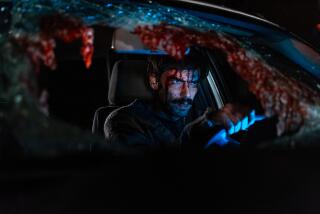Copying Protection Pays Off
According to a new study, home copying of prerecorded videotapes is down--saving the industry about $103 million a year in lost sales and rentals.
While the VCR population has increased by 8 million in the past three years, the research by Schulman, Ronca and Bucuvalas Inc. indicates that the number of duplicate tapes made by admitted copiers is down 20%, to 25 million from 32 million in 1990, when the company did its last study.
This represents a pat on the back for copy protection--and for the industry’s sole copy-protection firm, Macrovision Inc., which commissioned the study. Macrovision is on roughly half the cassettes on the market.
What Macrovision does, for less than 10 cents per tape for most movies, is put a code on the cassette that usually renders copies unwatchable because of audio-visual glitches. The company acknowledges that the system fails about 20% of the time. It can be defeated by the double-welled VCRs--which have a pre-recorded tape on one side and a blank on the other--or by so-called “black boxes” that can be hooked up to home-taping system.
“Both of those are small potatoes,” said Bill Krepick, Macrovision’s senior vice president of sales and marketing. “Our estimates show those VCRs, which are expensive, only sell about 30- to 40,000 a year. Regarding the black boxes in the survey we just did, there was only evidence of two black boxes per thousand homes. Whatever copying is done by those means isn’t enough to matter.”
Back in the mid-1980s, when Macrovision emerged, there were complaints that the coding was ruining the picture on the master cassette. “Those complaints have virtually disappeared through various refinements,” Krepick said. “Also, it turned out that a lot of the complaints came from people who were prevented from copying.”
Krepick said that technology exists to provide copy protection in other formats, such as pay-per-view via cable TV, but “it’s such a small market that the studios don’t care about it. It’s too much trouble for them to install copy protection to keep a few people from making copies of pay-per-view movies. Compared to home video, the losses aren’t significant.”
Macrovision is already working on copy protection for one of the upcoming movie-on-CD formats, video CD, which is being developed by Philips. “This format is attractive to manufacturers because the disc is cheaper to ship, package and label,” Krepick explained. “Consumers will like it because you can play it over and over without degradation. For a new format to get off the ground, copy protection is crucial--from the standpoint of the companies marketing the movies.”
He cited as an example the laser-disc format, which has no copy protection. One reason the market is still small, he said, is that new movies are frequently released on disc weeks after they’ve been on video because discs can be used to make such great video copies.
Don’t look for copy protection on laser discs any time soon, Krepick said. “There are so many different kinds of players that it’s hard to make it effective,” he explained. “If you put copy protection on the disc, it’s not compatible with some of the players--so it wouldn’t work.”
Upcoming on Video:
Originally scheduled to come out Aug. 18, LIVE’s “Chaplin,” starring Robert Downey Jr., was delayed to Wednesday. “The Dark Half,” starring Timothy Hutton and based on a Stephen King novel, is due out Oct. 27.
Also: “Map of the Human Heart” and “El Mariachi” (Wednesday); “National Lampoon’s Loaded Weapon 1” and “Fire in the Sky” (Sept. 15); “Married to It” and “Indian Summer” (Sept. 22); “Aladdin” (Oct. 1); “Jack the Bear” and “The Night We Never Met” (Oct. 6); “Indecent Proposal” (Oct. 13); “Three of Hearts,” “The Sandlot” and “Cop and a Half” Oct. 20; “Posse” and “Born Yesterday” (Oct. 27).
What’s New on Video:
“Groundhog Day” (Columbia TriStar, no set price). A caustic TV weatherman (Bill Murray) is mysteriously forced to relive Groundhog Day endlessly while on assignment in a small Pennsylvania town. At first it’s hell but then he takes advantage of his plight to fine-tune his seduction of a co-worker (Andie MacDowell). Inventive, often funny romantic comedy.
“Point of No Return” (Warner, no set price). This remake of the 1990 French hit “La Femme Nikita” is a barely passable action thriller--unless you’ve seen the original, with vibrant Anne Parillaud playing the junkie who’s transformed into government assassin. Then you’ll really hate the Hollywood version, which stars Bridget Fonda.
“Alive” (Touchstone, $95). In 1972, members of a Uruguayan rugby team survive a plane crash (a special-effects marvel) in an icy, remote section of the Andes Mountains and resort to cannibalizing the frozen corpses of their dead buddies. Based on a true story. Should be gripping and horrifying but barely holds your interest, partly because of unconvincing performances by a cast headed by Ethan Hawke and Josh Hamilton.
“This Boy’s Life” (Warner, no set price). In a small Washington town in the late ‘50s, a nomadic mother (Ellen Barkin) and her teen-age son (Leonardo DiCaprio) settle down for a few years when she marries a boorish bully (Robert De Niro). How they handle his abuse makes for a consistently absorbing survival drama.
“Brother’s Keeper” (Fox Lorber, $90). A riveting, atmospheric documentary--among the best of the last few years--about the aftermath of an apparent mercy killing that becomes a murder rap. Filmmakers Joe Berlinger and Bruce Sinofsky focus on the poor, elderly farmer from Upstate New York who’s accused of killing his brother and the community that rallies around him and his eccentric family. Even if you shy away from documentaries, check this one out; you won’t be sorry.
“Boiling Point” (Warner, no set price). A burned-out Treasury agent (Wesley Snipes) about to be shipped out of L.A. tracks his partner’s killer--a charming con-man (Dennis Hopper) who likes big-band music. Tries to be a 1940s film noir but fails miserably.






